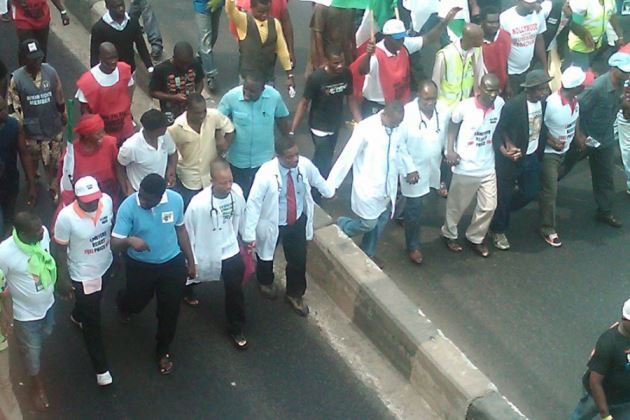Resident doctors in Nigeria have been on an indefinite strike action since Monday last week, following which, given previous experience of industrial actions in Nigeria, may not end soon.
The resident doctors are demanding from both the federal and state governments the immediate payment of their outstanding salaries for up to eight months in some cases; an end to irregular payment of salaries occasioned by the migration of their payroll to IPPIS; an upward review of their hazard allowance to 50% of their consolidated basic salary. They also want payment of their outstanding Covid-19 inducement allowance, as well as insurance coverage for all members and payment of death benefits for 19 of their colleagues who have died so far from Covid-19.
- PODCAST: COVID-19: Nigerians In Denial As Number of Cases Skyrockets
- Inside world of Abuja corporate beggars
The President of the National Association of Resident Doctors (NARD), Dr Okhuaihesuyi Uyilawa, had told the federal and state governments that, “Let our people that have died, their next of kin get the benefits so that their husbands or wives that died do not die in vain while serving the nation. Let the people that have been owed salaries be paid. The scheme of service brought in by the head of service be withdrawn… We will gladly go back to work as soon as possible.”
The federal government, meanwhile, has, on the one hand, passed the buck to the states, claiming that the issues for which the house officers are on strike are predominantly the responsibility of the states. On the other hand, through the Ministry of Labour and Productivity, it has invoked the “No Work, No Pay” against the doctors who provide what are termed “Essential Services” under International Labour Organization (ILO) rules. Still, the doctors have so far refused to return to work.
Needless to say, the strike has had untold consequences on patients and their relatives across the country, many of whom, according to news reports, have been left stranded in hospitals or prematurely discharged because of the lack of doctors to attend to them.
We are shocked by yet another avoidable strike by doctors. Indeed, the records indicate that the federal government wanted this strike to happen, without any thoughts on its consequences to patients. The residents made their demands to government in January, signed a memorandum of understanding with the federal government in March, with an addendum to it in April, following a ten-day strike action. Then they gave the government a four-week ultimatum in June, and eventually embarked on an indefinite strike last week on 2nd August.
In other words, the timeline of events has shown some restraints on the side of the doctors. The federal government had ample time to intervene and avert this needless strike. But it failed to seize the moment. Moreover, its invocation of the “No Work, No Pay” rule can only make things worse, not for the doctors, or the government, but for patients, many of whom must go without the care they need. And all of this is coming at a time when university teachers, under the auspices of the Academic Staff Union of Universities (ASUU) are also warming up for yet another strike.
We believe enough is enough with the endless and needless strikes in Nigeria. Government must be prepared to honour agreements it reaches with unions. We do not need strikes for government to act. In Nigeria, the health care system in particular is in shambles. Many citizens are not able to get the care that they deserve, adding strike to the mix is a bit too much. Resident doctors have embarked on strikes several times. These doctors are a crucial flank of the tertiary healthcare system, who go on to become consultants in various subfields of medical practice. It is quite sad that they have to spend a significant part of their training worrying about unpaid salaries or strikes.
It is time for the government to address the issues and put an end to the cycle. It should not look at temporary solutions but permanent ones. We, therefore, urge the government to immediately meet the demands of the doctors or return to the negotiation table and any agreement reached this time around should be honoured.
We appreciate the dilemma of the doctors. However, we urge them to always be realistic in their demands. Comparing what doctors in other countries earn to what they are being paid in Nigeria is not realistic and may not help the situation. They should make demands based on the peculiarity of their situation and that of the country. A permanent solution must be found to this crisis.

 Join Daily Trust WhatsApp Community For Quick Access To News and Happenings Around You.
Join Daily Trust WhatsApp Community For Quick Access To News and Happenings Around You.


